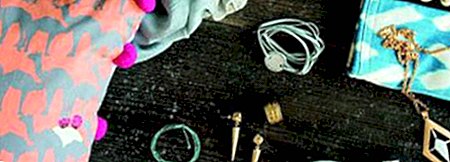Amodini: "Everything started in India"

In the online shop "amodini" Sophie Neuhaus sells jewelery, bags and handkerchiefs which were produced by hand and under fair trade criteria in developing countries. We talked to her about her sabbatical, the mill's everyday life and how a trip to India changed her life.

Sophie Neuhaus is the founder of the online shop "amodini", which she runs since May 2014 with her friend and first colleague Michi. From 25 to 27 September 2014, amodini opens a pop-up store in Hamburg Eppendorf.
ChroniquesDuVasteMonde: What does "amodini" stand for?
Sophie Neuhaus: "Amodini" is Hindi and means "happy girl". And it's the name of our online store. We sell handmade products that are manufactured under fair trade conditions in developing countries. But not typical products you have in mind when thinking of fair trade and world shops.
What do you mean by that?
Unfortunately, the whole topic of "fair trade" often has a boring eco-image. At least that's the feedback we got in the beginning. We are therefore looking for products that appeal to younger people and are fashionable.
What products would you sell under no circumstances?
We have jewelery, bags, scarves and home decors on offer. What we do not offer is clothing. We are considering adding shoes to our range. But we will keep our fingers off clothes in the future.
Why?
It seems much more expensive to sell clothes. With all the different sizes and styles that are different in European countries than in developing countries.
Where do you get your products from?
That is very different. For example, from India. There we have many partner projects. Also from Southeast Asia, so Laos, Cambodia and Thailand. We have a project in Kenya and we are slowly starting with South America.
How did you come up with these projects?
I researched a lot on the internet and then contacted some projects. As it is, one project then takes you to the next. In the meantime, we are also found: A project from India has just come to us, which makes bowls out of copper and fulfills all our criteria.
 © Amodini
© AmodiniWhat are these criteria?
There are basically two criteria: First, it should be handmade products. Because we are afraid that the manual skills are no longer carried. Secondly, it is important to us that good and safe working conditions prevail, ie no child labor and reasonable working hours.
And how do you verify that these criteria are met? They can tell you a lot when you're so far away.
That's right, so I'll be flying to India for three weeks in the fall to see and examine the projects we work with there. So to speak, back to the beginning.
How can I understand that?
Everything started in India. I previously worked as a tax consultant at a large accounting firm in Hamburg. Then I took a sabbatical and wanted to travel for six months.
And why India of all people?
I have wanted to go to India for a long time. I traveled around the country for a month and then volunteered for two months with the NGO "Sambhali Trust" and taught children in mathematics and English in a small village in Rajasthan.
It does not have that much to do with fashion ...
No. But the NGO I worked for also had a project in Jodhpur teaching women to sew. The women have sewn small bags, pillows or scarves that are sold in a boutique. I was very impressed by the project. It makes sense to give women work and pay them! Often they can handle money much better than men. They ensure that their children get enough food and access to education.
Do you remember the moment when you came up with the idea of founding "amodini"?
Yes. When I came back to Germany after three months in India, I was totally upset by all the experiences. I then thought a lot about how we live here in Germany. How well I am. And how small my problems seem compared to what I experienced. I did not want to continue like this.
And?
I thought about what I could do. How can I give something back and engage socially? At some point I had the idea for "amodini" and the story took its course.
How did your friends and family react?
They were a bit skeptical at first. Is this just a phase or is she serious? But then I explained why I want to do that.And why is that after the time in India a good time, before I put back in this mill. My previous job as a tax consultant was good and sure, but something was missing.
Did they actually return to the office when their sabbatical was over?
No. I quit directly. In principle, my sabbatical was over after three months, because then I worked highly motivated only on "amodini".

Screenshot of the amodini website
And then what happened after your idea was born?
I have made a small survey among friends and acquaintances. And think about what's better, a store or an online store. And now we are online since May 2014.
When you talk about it, it sounds like everything went through in one go. Did not you doubt for a second?
Oh, certainly. I also had many sleepless nights when I woke up and asked myself: What am I doing here? Can this work at all?
Are there mistakes that you regret?
The whole project is a learning process and of course we make mistakes. But I do not regret the decision to "amodini". But sometimes I think, if I had already gone to India after graduation ...
... then?
... then maybe everything would have been different. Then I probably would not have studied business administration but might now work in development aid. Who knows? But as it has now come, it is also good.










